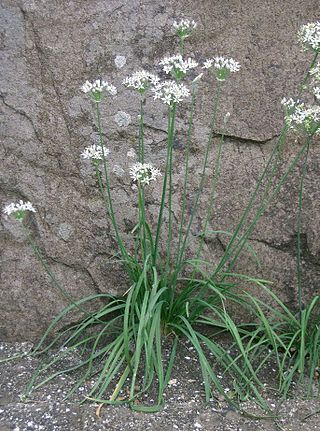
Allium tuberosum is a species of plant native to the Chinese province of Shanxi, and cultivated and naturalized elsewhere in Asia and around the world.

Ribes triste, known as the northern redcurrant, swamp redcurrant, or wild redcurrant, is an Asian and North American shrub in the gooseberry family. It is widespread across Canada and the northern United States, as well as in eastern Asia.

The redcurrant or red currant is a member of the genus Ribes in the gooseberry family. It is native to western Europe. The species is widely cultivated and has escaped into the wild in many regions.
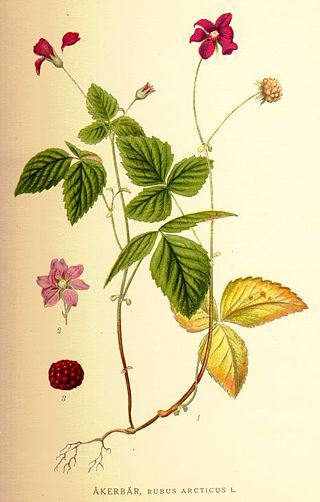
Rubus arcticus, the Arctic bramble or Arctic raspberry, is a species of slow-growing bramble belonging to the rose family, found in Arctic and alpine regions in the Northern Hemisphere.
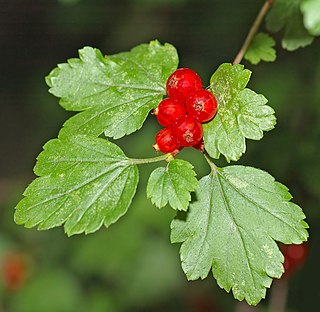
Ribes alpinum, known as mountain currant or alpine currant, is a small deciduous, dioecious shrub native to central and northern Europe from Finland and Norway south to the Alps and Pyrenees and Caucasus, Georgia; in the south of its range, it is confined to high altitudes. It is scarce in western Europe, in Britain being confined to a small number of sites in northern England and Wales.

Ribes bracteosum, the stink currant, is a species of currant native to western coastal North America from southeastern Alaska to Mendocino County in California.

Ribes aureum, known by the common names golden currant, clove currant, pruterberry and buffalo currant, is a species of flowering plant in the genus Ribes native to North America.

Malus baccata is an Asian species of apple known by the common names Siberian crab apple, Siberian crab, Manchurian crab apple and Chinese crab apple. It is native to many parts of Asia, but is also grown elsewhere as an ornamental tree and for rootstock. It is used for bonsai. It bears plentiful, fragrant, white flowers and edible red to yellow fruit of about 1 cm diameter.
Ribes amarum is a species of currant known by the common name bitter gooseberry. It is endemic to California, where it is known from mountains, foothills, and canyons. Its habitat includes Chaparral.

Ribes cereum is a species of currant known by the common names wax currant and squaw currant; the pedicellare variety is known as whisky currant. The species is native to western North America.
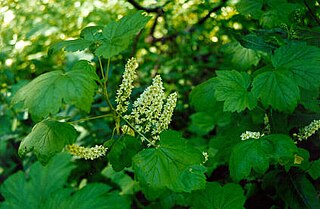
Ribes hudsonianum is a North American species of currant, known by the common name northern black currant.
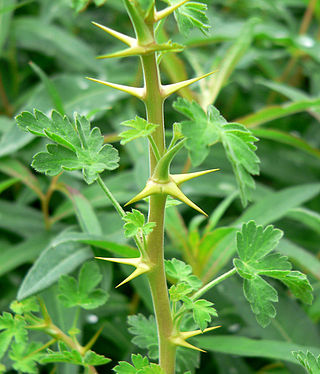
Ribes montigenum is a species of currant known by the common names mountain gooseberry, alpine prickly currant, western prickly gooseberry, and gooseberry currant. It is native to western North America from Washington south to California and east as far as the Rocky Mountains, where it grows in high mountain habitat types in subalpine and alpine climates, such as forests and talus. It is a spreading shrub growing up to 1.5 meters tall, the branching stems covered in prickles and hairs and bearing 1 to 5 sharp spines at intervals.

Ribes roezlii is a North American species of gooseberry known by the common name Sierra gooseberry.

Ribes americanum is a North American species of flowering plant in the gooseberry family known as wild black currant, American black currant, and eastern black currant. It is widespread in much of Canada and the northern United States.

Iris lactea is a species in the genus Iris. It is also in the subgenus Limniris and is the only species in the series Ensatae. The Japanese water iris, Iris ensata, is actually in series Laevigatae. It is a rhizomatous perennial, from central Asia, with pale blue or violet flowers. It is cultivated as an ornamental plant in temperate regions.

Ribes acerifolium is a North American species of currant known by the common names mapleleaf currant and maple-leaved currant. It is native to the Canadian Province of British Columbia as well as to the northwestern United States.

Ribes erythrocarpum is an uncommon North American species of currant known by the common name Crater Lake currant. It is native to the Cascade Mountains in the US State of Oregon, including inside Crater Lake National Park.
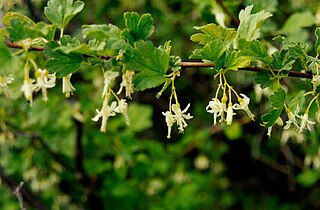
Ribes niveum is a North American species of currant known by the common names snowy gooseberry, white-flowered gooseberry, or snow currant. It is native to the western United States.
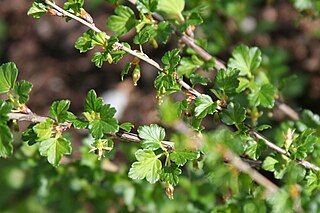
Ribes rotundifolium is a North American species of currant known by the common names wild gooseberry and Appalachian gooseberry. It is native to the eastern United States, primarily the Adirondacks, from Massachusetts and the Appalachian Mountains south as far as South Carolina and Tennessee.

Ribes wolfii is a North American species of currant known by the common names Wolf's currant and Rothrock currant. It is native to the western United States. The distribution is disjunct or discontinuous, with two distinct concentrations of populations separate by a gap of over 320 km. One is in northern Idaho, northeastern Oregon, and southeastern Washington. The other is in Utah, Colorado, Arizona, and New Mexico. There is also a report of an isolated population south of the border in Chihuahua, Mexico.



















